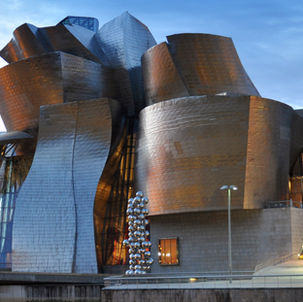Museos
Un museo (del latín, musēum y este, a su vez, del griego, Μουσείον) es una institución pública o privada, permanente, con o sin fines de lucro, al servicio de la sociedad y de su desarrollo, y abierta al público, que adquiere, conserva, investiga, comunica, expone o exhibe, con propósitos de estudio y educación, colecciones de arte, científicas, entre otros, siempre con un valor cultural, según el Consejo Internacional de Museos.
La ciencia que los estudia se denomina museología, la técnica de su gestión museografía y la administración de los mismos, museonomía.
Los museos exponen colecciones, es decir, conjuntos de objetos e información que reflejan algún aspecto de la existencia humana o su entorno. Este tipo de colecciones, casi siempre valiosas, existen desde la Antigüedad: en los templos se guardaban objetos de culto u ofrendas que de vez en cuando se exhiben al público para que pudiera contemplarlos y admirarlos. Lo mismo ocurría con los objetos valiosos y obras de arte que coleccionaban algunas personas de la aristocracia en Grecia y en Roma; los tenían expuestos en sus casas, en sus jardines y los enseñaban con orgullo a los amigos y visitantes. Fue en el Renacimiento cuando se dio el nombre de "museo" tal y como hoy se entiende a los edificios expresamente dedicados la conservación y exposición de sus colecciones permanentes. Por otra parte están las galerías de arte, donde se muestran pinturas y esculturas, en exposiciones temporales, sin que necesariamente posean colecciones permanentes. Su nombre deriva de las galerías (de los palacios y castillos), que eran los espaciosos vestíbulos de forma alargada, con muchas ventanas o abiertos y sostenidos por columnas o pilares, destinados a los momentos de descanso y a la exhibición de objetos de adorno, muchas veces obras de arte.
Después de la Primera Guerra Mundial (1918) surgió la Oficina Internacional de Museos, que articuló los criterios museográficos cuyos programas y soluciones técnicas son vigentes hoy en día. En 1945 nació el Consejo Internacional de Museos (ICOM, por sus siglas en inglés) y en 1948 aparece la publicación periódica Museum mediante la cual se difunden hasta hoy en día las actividades de los museos en el mundo.
Museums
A museum (from the Latin, musēum and this, in turn, from the Greek, Μουσείον) is a public or private institution, permanent, for profit or not, at the service of society and its development, and open to the public, that acquires, preserves, investigates, communicates, exposes or exhibits, for study and education purposes, art and scientific collections, among others, always with a cultural value, according to the International Council of Museums.
The science that studies them is called museology, the technique of their management museography and their administration, museonomy.
Museums exhibit collections, that is, sets of objects and information that reflect some aspect of human existence or its environment. This type of collections, almost always valuable, have existed since ancient times: in the temples, objects of worship or offerings were kept that are occasionally displayed to the public so that they could contemplate and admire them. The same thing happened with the valuable objects and works of art that some people of the aristocracy collected in Greece and Rome; They had them displayed in their homes, in their gardens, and proudly displayed them to friends and visitors. It was in the Renaissance when the name of "museum" was given as today is understood to the buildings expressly dedicated to the preservation and exhibition of their permanent collections. On the other hand, there are the art galleries, where paintings and sculptures are displayed in temporary exhibitions, without necessarily having permanent collections. Its name derives from the galleries (of the palaces and castles), which were spacious, elongated lobbies, with many windows or open and supported by columns or pillars, intended for moments of rest and the display of ornaments, many sometimes works of art.
After the First World War (1918) the International Museum Office emerged, which articulated the museographic criteria whose programs and technical solutions are in force today. In 1945 the International Council of Museums (ICOM) was born and in 1948 the periodical publication Museum appeared, through which the activities of museums in the world are disseminated to this day.
MUSEOS EN LA REPÚBLICA DOMINICANA
LOS MUSEOS MAS IMPORTANTE DE LA ACTULIDAD
MUSEOS DEL MUNDO
SEIS DE LOS MUSEOS MAS IMPORTANTE EN LA ACTUALIDAD
 |
|---|
 |
 |
 |
 |
 |
 |























